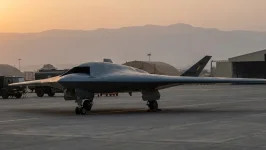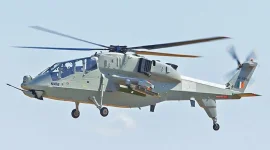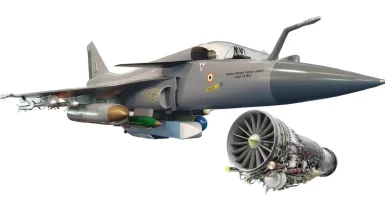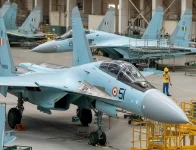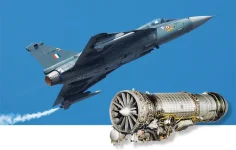- Views: 5K
- Replies: 7
Hindustan Aeronautics Limited (HAL) has outlined a clear development and production schedule for the Tejas Mk2, India's advanced new-generation Light Combat Aircraft. The company aims for the aircraft's first flight to occur in the first quarter of 2026, between April and July. Series production is planned to start by 2029.
This ambitious project is a significant part of India’s ‘Self-Reliant India’ (Atmanirbhar Bharat) initiative in the defence sector. To speed up development, an intensive three-year testing period will be conducted using four pre-production aircraft. The Indian Air Force (IAF) can expect to begin receiving the Tejas Mk2 from 2032 onwards, bolstering its fleet.
Known also as the Medium Weight Fighter (MWF), the Tejas Mk2 is engineered to be a significant upgrade over the existing Tejas Mk1 and Mk1A models. It will feature a larger body, small wing-like structures near the nose called close-coupled canards for improved manoeuvrability, and a more powerful General Electric F414-INS6 engine.
The aircraft will also be equipped with advanced electronics, including a state-of-the-art Active Electronically Scanned Array (AESA) radar for superior target detection and an Infrared Search and Track (IRST) system.
Capable of carrying 6,500 kg of weapons and compatible with Indian-made missiles like the Astra and BrahMos-NG, the Tejas Mk2 is set to replace older IAF aircraft such as the SEPECAT Jaguar, Dassault Mirage 2000, and Mikoyan MiG-29.
Following its maiden flight in early 2026, the Tejas Mk2 will undergo a structured three-year testing program, according to HAL. The initial two years will be dedicated to flight development, focusing on validating the aircraft's aerodynamic capabilities, engine performance, and flight control systems. This stage will ensure the aircraft meets the IAF's strict requirements for airworthiness and agility.
The third year will concentrate on testing its combat systems, which includes integrating and certifying a range of air-to-air and air-to-ground weapons, along with its electronic warfare suite and sensor packages.
To fast-track this critical phase, HAL will build four pre-production Tejas Mk2 jets. This approach allows different tests to be conducted simultaneously on multiple aircraft, reducing delays and ensuring a thorough evaluation within the set timeframe.
Assembly of the first Tejas Mk2 prototype is currently underway at HAL’s facility in Bengaluru and is reported to be over 70% complete. Key sections like the central part of the fuselage, wings, and engine integration are progressing well. The aircraft is expected to be formally unveiled, or "rolled out," by late 2025.
After the rollout, it will undergo a series of ground tests, including engine runs and taxiing trials, before it takes to the skies for the first time.
The first flight target was slightly adjusted from late 2025 to the first quarter of 2026 due to the complexities of incorporating advanced subsystems, a challenge HAL is addressing with its expanded testing strategy using multiple prototypes.
These pre-production jets will be vital in achieving Initial Operational Clearance (IOC) by 2028, which signifies the aircraft is ready for operational use and paves the way for full-scale production.
HAL expects to finalize a contract with the Indian Air Force for the Tejas Mk2 by 2029, which will allow series production to commence in the same year.
Deliveries to the IAF are anticipated to begin in 2032. The initial order is likely to be for 110 to 120 aircraft, enough to equip six squadrons, with the potential for up to 210 additional units in the future.
This timeline supports the IAF's ongoing modernization efforts, as it seeks to replace its ageing aircraft fleet while addressing regional security considerations.
The programme aims for a high level of indigenous content, starting above 82% and expected to rise to over 90% once engine production is also localized in India, significantly strengthening the nation's self-reliance in defence manufacturing.
The Tejas Mk2 programme received a major boost with the approval of Rs 10,000 crore in funding by the Cabinet Committee on Security (CCS) in 2022. This financial backing enables HAL to utilize the existing supply chain established for the Tejas Mk1 and to collaborate with private sector companies such as Tata Advanced Systems and Larsen & Toubro.
The strategy of using four pre-production aircraft for testing, a method employed in major international fighter development programmes, highlights HAL’s dedication to meeting the project deadlines while ensuring the highest quality standards for this advanced combat aircraft.

